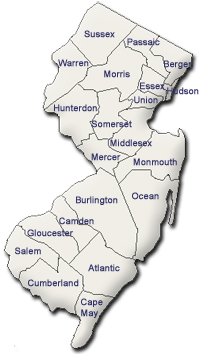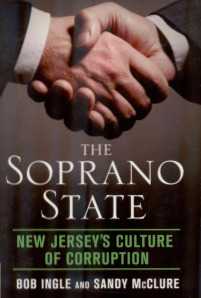Related Topics
Reminiscences
"The past is never dead. It's not even past." -- William Faulkner, Requiem for a Nun
New Jersey (State of)
 The Garden State really has two different states of mind. The motto is Liberty and Prosperity.
The Garden State really has two different states of mind. The motto is Liberty and Prosperity.
Personal Passions
My own personal short list; eight decades in retrospect.
State Capitol Think Tanks
 States rights will be neglected as long as state governments remain so second-rate. 
|
Setting aside one's political party preferences, it is hard to deny the considerable increase of new and sophisticated ideas generated by the Republican party in the past twenty years. For fifty years before the Reagan Revolution, it was quite the reverse. All of the bright new ideas -- good and bad -- seemed to bubble out of the Democratic Party, while the Republicans just sulked and muttered. Even when Eisenhower swept the Democrats out of power, he was mostly riding a crest of idea fatigue. Leave us alone for a while. Thirty years before that, Harding came into office promising a "Return to Normalcy". The country does occasionally get fed up with pesky innovation, but for nearly a century we became accustomed to ideas ("reform") coming from the left, resistance coming from the right.
Yes, the pendulum does swing back and forth spontaneously. And yes, Adolf Hitler inadvertently stirred the American intellectual pot by chasing the Austrian school of economics to our shores, primarily landing at the University of Chicago. Nevertheless, a case can be made that it was the establishment of a number of think-tanks in Washington which brought conservatism to life as a positive force. The model was already in place, at the Brookings Institution and the Institute for Advanced Study in Princeton. In each case, a very wealthy man decided to endow an institution for the promotion of ideas congenial to himself or his religion. In the case of Bamberger the department store mogul, the think tank was mainly created to house one man, Albert Einstein. While Bamberger and Brookings were liberals, their model was copied by Otis at the American Enterprise Institute, Coors at the Heritage Foundation, Koch at the Cato Institute.

|
| class= |
It does not seem to have occurred to the existing think tanks that one of their favorite ideas might be accomplished internally, within the think tank world itself. That idea is devolvement of power from centralized Washington to the fifty various state governments. Anyone can see, on any weekend, that urban Washington DC has outgrown its blood supply. The traffic jam out on Fridays is matched by equal paralysis on Monday morning as the crowd returns to work. In spite of a splendid highway system, designed at least in part with emergency evacuation in mind, the place is both unlivable and dysfunctional as a place to work. Twice each week, the Southern half of the East Coast is cut off from the Northern half by this gigantic traffic jam, just as effectively as if Generals Lee and Grant were conducting battles there. Components of one administrative department are cut off, not only from other departments but from other components of the same department. The headquarters of the Department of Health and Human Services is eight miles away from the National Institutes of Health in Bethesda, and thirty miles from Medicare headquarters in Baltimore. The headquarters of the whole country is cut off from the rest during the working week and essentially deserted on weekends. The need to decentralize the federal government in some way is a case that can be made on physical issues alone, quite ignoring the philosophical issues of states rights, local autonomy, or shortening the chains of command.
And yet, it must be admitted. State governments are just terrible. They are almost all located in small one-industry towns, at a considerable distance from population centers, universities, business, and commerce. Almost no state capitol has a good airport or good air service. The hotels are mostly despicable. As for entertainment, there is essentially nothing for a visitor to do, there. It doesn't matter how this came to be the case, but Illinois provided us with an insight into the process when Abraham Lincoln helped some railroad and real estate interests by dropping the state capitol in Springfield, naturally enriching a large number of local landholders, thereby. The state capitals used to be in Philadelphia, New York, and Boston; now they are in Harrisburg, Albany, and Springfield. The elected representatives clearly prefer to do their work out of sight, and because it is out of sight it can be incompetent, corrupt and unaccountable to anyone. It is a hopeless task to move the capitals back into the sunlight because the legislators prefer it to remain this way. But because state government are such a hopeless mess, it is unthinkable to devolve federal functions to them.
It's probably useful to remember that our Constitutional Convention was motivated to transfer as much power as possible from state legislatures to the central government. That turned out to be just a few powers, so the framers assumed that the vast majority of government would take place in state capitals. That's how things were under the Articles of Confederation, but unfortunately included watering the currency and passing debt-forgiveness laws. Control of the currency and regulation of private contracts, at least, should remain out of the hands of the state legislatures. When state governments were instruments for both starting the Civil War and resisting Reconstruction, furthermore, the victors became even further determined to weaken state government effectiveness. But moving the Department of Agriculture to Nebraska and the Department of the Interior to Colorado or the National Archives to Philadelphia and the Department of Defense to Austin are examples of devolving functions to different areas of the country rather than to different electoral bodies, and they all sound like things which might be feasible to move, just to relieve the traffic in Maryland and Virginia.
But here's a different place to start: if state governments flee from the sunlight, let's chase them with sunlight. Who knows a likely billionaire, able and willing to start a think tank in the sticks? If it works, perhaps others will imitate it. Every state capital city ought to have at least four think tanks. Unfortunately, there are at least forty which have none at all.
Originally published: Thursday, June 22, 2006; most-recently modified: Wednesday, June 05, 2019